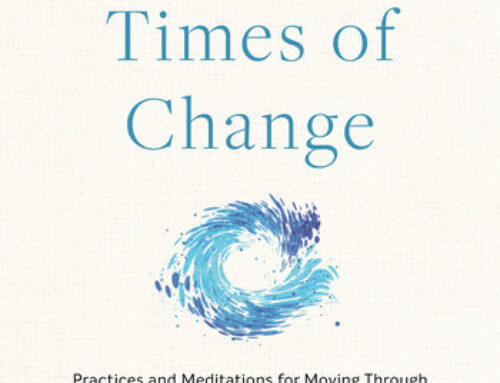In this W.O.W. Chat episode, I chat with Dr. Gabor Mate, renowned best selling author, highly sought after international speaker and physician, about his work and perspectives surrounding ‘Compassionate Inquiry’ when working with patients (and in his personal life too)! I ask Dr.Mate to comment on a statement he made while compassionately inquiring with someone at one of his workshops.
Dr. Mate generously shares what was going on ‘inside’ of him, the importance of awareness, what he did to address it, and how this relates to all health care providers as we compassionately inquire with patients to help attune to and align with each patient and his or her needs, which ultimately helps to reduce suffering.
Have a listen to the 8 minute W.O.W. Chat video HERE or read the entire transcript below:
Shelly Prosko: Welcome to my W.O.W. Chats! Words of Wisdom with people I admire and respect and whose work is in line with making this world a better place. I have the honour and the privilege of bringing the Words of Wisdom of Dr. Gabor Mate!
Gabor Mate: Well thanks for those kind words.
Shelly: Thank you so much. For those of you that don’t know Dr. Mate or maybe you don’t know of his work, just look at all the links below. I’ll leave his website and links to his books and calendar of events below.
I just spent two full days with Gabor at his Compassionate Inquiry Workshop. (In this workshop, Gabor demonstrates how he compassionately inquires and how he uses different concepts and approaches with people).
Yesterday, there was something that happened that I would like you to comment on and just elaborate on a little bit. It was when there was a woman up on stage and you were working with her, and there was a moment that felt a bit off — just not in that flow –and sure enough, you said something under your breath; you said, “I’m trying too hard. I’m working too much . . .” and then you sort of switched course. And I’m wondering if you can comment on that and maybe even how it relates to healthcare practitioners in the therapeutic environment.
Gabor: Mmm. Well – thanks for the question. I don’t actually recall the specific incident. When I am actually doing the work I am so much in the flow, I actually end up not recalling what happens. But I can certainly relate that to other times when that has occurred. So, it’s compassion and inquiry. It’s really about going into what’s behind people’s feelings, states, emotions, and behaviours and chronic patterns. And to conduct it effectively, it’s not enough that I pay attention to the client, but I have to really pay attention to the client’s voice, facial expressions, body language. In other words what they are messaging me about their internal states, and not just what they are saying and how they’re saying it; but also who is present in them at that moment.
So that requires attention. But requiring equal attention is what’s happening inside me. So what would have happened in that incident yesterday, is that I would have noticed some tension inside me . . . inside myself. Which is not about the client, it’s about what’s happening inside of me at that moment. And that happens when I’ve got an intention and I’m maybe working a little bit too hard to get the client aligned with my intention. But getting the client aligned with my intention is not the purpose of the work. The purpose of the work is to get me in line with the client’s intention and the client’s needs and internal states. So if I find myself pushing too hard, trying to get them to see something that I might see that I want them to see, then I’m going to notice the tension in myself. And my mantra on that is: whenever there is tension, it requires attention.
So it requires that I tend to myself because I know surely from grievous past practice, that if I’m pushing too hard on a client, and if I don’t pay attention to that tension myself, I’m actually gonna never mind not help them, I may even create some unnecessary suffering for them. So that’s what that would have been about.
Shelly: Thank you for sharing that. I resonate with that as well and if I can just ask you one other thing about that. When you said you noticed the tension: is it a feeling that’s always the same? Is it something that you’re familiar with every time or does it change and depend? Do you sometimes feel it differently in your body, your breath, or your mind? Do you know what I’m getting at? Is it the same cue?
Gabor: Well I can give you two broad cues. On a body level, it’s actually . . . if I pay attention, there is a tension here in my chest area. On a mind level, I’m wanting them to see something. I’m really wanting something to happen that isn’t happening. I’m not inquiring anymore. Inquiring means you don’t know and you’re curious. When I want something to happen and I know where I wanna go with it, that’s not curiosity anymore. That’s not inquiring anymore. And so if I notice that urgency on a mind level or a tension in the body, then it’s absolutely time for me to pause and inquire as to what’s going on with them, and what’s going on with me . . . And just to switch gears.
And, as soon as I do, I just feel an easing of the tension and an easing of the compulsiveness of the intention.
Shelly: I find then at that point, the mind becomes clearer too and things become more in flow.
Gabor: Yah. Well my mind becomes clearer because I have removed this content; but the mind of the client becomes clearer too. Because when people are pushed upon — if they perceive themselves as pushed upon even when they may not be pushed upon — it puts them into physiological and neurological states of defensiveness. And as soon as you put somebody in the state of defensiveness, their mind doesn’t work; their upper brain circuits don’t function as well. So, it certainly leads to clear thinking on the part of the healthcare provider and it certainly leads to more clarity on the part of the client as well. And with clarity, you clear out what’s in the way . . . then there’s clarity.
Shelly: I hope so many of you healthcare practitioners find value in that. Do you use that in your regular personal life too, in relationships (giggle)?
Gabor: Just a minute, what kind of interview is this anyway (smile and chuckle)? Yeah, more and more I do, yeah. You know, I hadn’t always and hadn’t for a long time. The effects of, let’s say my relationship with my wife, we were always negative. And so, I have actually learned to do that. And it creates SO much space; so much space and so much more clear and loving communication.
Shelly: That’s beautiful. Thank you.
Gabor: And thank you
Shelly: Words of Wisdom with Gabor Mate! I hug people. Are you a hugger . . .?
Gabor: Absolutely
Shelly: Thank you So much . . . I really appreciate it.
Gabor: My pleasure. Thank you
Shelly: Thank you.
Thanks for watching this W.O.W. Chat episode with Dr. Gabor Mate. Please check out some of my other WOW chats with people that I admire and respect!
For more information on Dr. Gabor Mate’s phenomenal and transformative work, his many best selling books, and upcoming calendar of events worldwide, please visit www.drgabormate.com
Dr. Mate’s books: https://drgabormate.com/book/
“When the Body Says No”
“In the Realm of Hungry Ghosts”
“Scattered Minds”
“Hold On To Your Kids”
For more “Words Of Wisdom” from people that Shelly admires and respects, please check out some of her other W.O.W. Chats!





Hey Shelly ! Kilee here from embodied yoga therapy program in Ottawa. Might not remember me as you meet so many beautiful souls! I found this conversation to be so amazing and to hold so much about what I think my program is all about.
This discussion brought about this question for me.
I notice myself trying to get people to see or feel a certain response in my public studio classes a lot, it’s like a state of teaching I drop into that feels safe but also extremely scripted. It scares me to the core, especially afterwards reflecting on my lack of curiosity, that instead I am trying to impose on them to be as I am : curious. In times of
Being attentive, letting what unfolds unfold I get a lot of push back from students along this line: I want clear instruction about what I should feel. When I should feel it.
What do you do with that, it must happen in your physiotherapist world. Where a clients strongly holds beliefs about what your role is , how you should do it , what to except and if you don’t meet that then the easiest answer is: she or he is not
Good at there job.
What is your resolution or place of inquiry for this ?
Hi Kilee! I do remember you at the course – it was a delight to have you there and your contribution and questions!
Thanks for watching this W.O.W. Chat and for your comments and inquiry. You pose a great question and I have many insights on this; as you are correct, I do run into people wanting simple answers and quick fixes. Sometimes there are simple answers; sometimes there are not.
In my experience, with appropriate inquiry, I find that most people are really just looking for direction and relief from suffering; but not necessarily wanting someone to tell them how or what to feel. I would agree that some people appear to be less trusting of their own experience and abilities than others.
Part of my job is to allow people to have their own experience (safely) and not force an experience that I think they ‘should have’ on them that is not their own. It’s part of the art and science of being a facilitator and a guide. People learn and transform when they have their own experience. We know that telling people what to do or feel isn’t as strong of a catalyst for change as when they have their own experience; the motivation has to come from within.
We can still give people guidance and clear instructions, but without telling them what to ‘feel’. When you mentioned that people say, “I want clear instruction about what I should feel. When I should feel it.” I would say that most people need/want instruction on what to do, but not necessarily want us to tell them how to feel specifically. I suppose some may think they want someone to tell them how to feel — but if we are doing our jobs well, we will give them space and agency to feel and experience on their own.
And in my experience, people appreciate and want that freedom ultimately. So yes, we still give them the clear instructions and framework, which may be movements, breath practices, or other techniques to perform and explore, and cues to go along; but they are having their own experience with the practices we give them, whatever that may be. As people progress along, they need less and less of our guidance and start to even discern which practices would be best for them in the context of their situation.
If someone were to ask me, “where should I feel that?” — I may simply answer with another question, ‘where do you feel it?’ And depending on their answer, that would guide me on how further to respond. But I would try to be clear that we’re not searching/looking for a right or wrong place or way to feel — but that the intention and goal of the session/class is about enhancing awareness, presence and having whatever experience they have (if that’s indeed the intention – it might not be
There needs to be a general understanding that cultivating awareness is the first step to change. And you can’t cultivate awareness by having someone else telling you how to feel. In my experience, most people understand and appreciate that and really resonate with it; and often find it liberating.
I may also explain to them that I can best help them if they explore their own experience, and then that will inform how I can help them better! Basically, I make it clear that they are allowed to give themselves permission to have whatever experience arises — and that will help me help them in the most optimal way I can.
Part of the process is cultivating this understanding and approach — and having people understand this approach right from the beginning. It can be done in many different ways.
Another example: if the person asks ‘where should I feel this in my body’, it’s my job as a guide to help them first feel safe, then guide them to stay present and in their body (often if they are asking that question, that means they may be ‘thinking’ and analyzing too much and not connected to the fully embodied experience
But we can still provide them with clear instructions and direct their attention and focus and help them that way. Particularly if you do find that someone prefers to be told more specifically what to do (especially early on in their journey), we can keep redirecting them to stay inside their body and offer very specific cues re: where to focus their attention, but without telling them what to feel.
I may offer some general cues like: ‘notice where your foot is and how the weight is distributed through it throughout the movement; notice the amount of weight on your right arm ….and then the left one..and notice any differences or similarities in sensations; notice where your fingers touching and where are they apart; notice any physical sensations (I might specifically say ‘notice if the breath moves the body on your left side trunk’); notice where you might feel a stretching sensation, or any physical discomfort, or feelings of ease or pleasure; is your jaw clenched? is there tension anywhere in neck/shoulders? notice how the breath moves the low back; notice if there is more weight on one side or the other or how the weight changes across the feet as you do that movement; notice the breath and how it might be moving in your body, notice if one side feels different than the other … etc etc.
There are many cues; but we learn to ask more of those open ended-questions and facilitate a voice of inquiry and exploration within the person. Best is to continue to receive feedback from your class after too. For me, I receive positive feedback and see change in people with this type of approach- but it does take time, practice, and your own curiosity to develop. And if your class is still struggling with this approach, try some different approaches to see what might resonate with them and don’t give up. I agree, you do have to meet people where they’re at!
It is wonderful to hear that you are aware of this tendency you have. Congrats You will figure out the language and approaches to use to offer this same type of guidance to your class. Keep curious and keep trying and making mistakes – that’s the way to evolve.
You will figure out the language and approaches to use to offer this same type of guidance to your class. Keep curious and keep trying and making mistakes – that’s the way to evolve.
Thanks again for reading and commenting! I hope you found some value and inspiration in my response. Please keep in touch and hope our paths cross again some day.
Best,
Shelly
Your reply was so incredibly helpful. Thank you for taking the time to respond in such a detailed and easy to discern way.
I am very happy that we met and I had the utmost pleasure learning from you and all the practices that you shared with us.
I feel more settled by this response as many times I do use this inquiry type language. Thinking back to the times I direct feeling or movement cue without inquiry are moments I am fatigue, I’ll keep checking in with myself more often, understanding that I too am a resource, when teaching .
I will be copying this reply down and keeping it close .
Kilee, it’s wonderful to hear this was so helpful for you and that you recognized this voice of inquiry in your teaching style already! It was helpful for me to organize my thoughts also. What a marvelous process for us all, including myself – and we can be patient and kind to ourselves as we learn and grow. I also don’t believe there is a ‘right’ or ‘wrong’ way to cue, much depends on the intention.
It was a pleasure to meet you and share space with you.
Thanks again for reaching out and sharing on here!